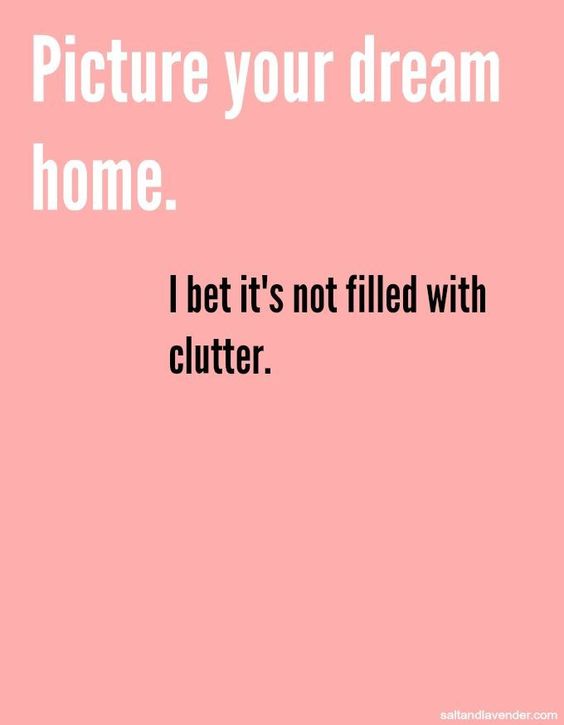Picture your dream home. I bet it's not filled with clutter.
My husband and I just closed on our first condo together. Yay! It's been an exciting few weeks to stay the least. When we first started the process, we met with a mortgage loan officer to see how much we could afford. We had already ran a few numbers using the myriad of calculators on the web and had a number in mind. On our initial meeting, the loan officer looked at our financials and said “you know you could afford more.” We said thanks and stuck with our original borrow amount. A week or two into our search, we saw a place that we liked and were tempted to increase our budget. For a brief minute, we were going to increase our budget, but thankfully came to our senses. Buying a home is a serious, important and personal decision and I think it's critical that when it comes to making this decision that you really keep in mind your needs, not your wants and not the influence of others. Societal conventions will push you to get more, but more doesn't also mean better.
In the end, we opted for a small one bedroom condo well within our initial budget. It fits our current needs. An important factor to is that a smaller home is the most sustainable choice for us today financially and environmentally.
Smaller Home, Smaller Footprint
There are many advantages to having a smaller home. Along with the cost, the second is the environmental footprint. A smaller home always means less space to heat and cool, less opportunity to use and waste electricity and less space to furnish. Sometimes we take for granted that a house uses resources, energy and generates carbon emissions as well. It doesn't seem as obvious since we don't see the exhaust like we see it in cars, but as long as the house uses energy from external sources (besides solar/wind), we can trace fossil fuels being burned.
We also can't forget all of the materials used to build housing. Wood has to be grown and harvested. Plastic is used to create insulation, piping, siding. Metal has to be mined, extracted and molded. The good news is that most homes last many years, but if we keep building bigger, we continue to strain the Earth's resources for our large homes.
So I am looking forward to a home where our electricity and water bill isn't so high. I'll be posting updates about what we end up using.
Smaller Home, Less Maintenance Time
As we looked at houses, we came across a beautiful home in a quiet street. It had a large front yard. The backyard was already set with a garden bed, clothing line and was already gated (for my potential chickens.) It was a two-bedroom house with lots of space and a good layout. It was a great house, but one of the things that gnawed at me as we walked around was why I didn’t like it as much. It seemed like it fit what we wanted. The reality though was it wasn’t what we needed especially at this point in time in our lives.
Seeing the large front and backyard allowed us to see potential, but it also brought up some anxiety about maintenance. While I love to be outside, I didn’t want to spend our weekends weeding and taking care of the lawn truthfully. While, my dream one day will have to have a small garden farm, we are not ready for that today. We also had to admit that my husband is a city boy, having grown up in Istanbul and couldn’t see himself mowing the lawn and staying home all weekend to do house repairs.
The reality too is that a large house means more maintenance, more expenses and more time. As someone trying to reduce excess stuff and distractions, this did not bode well with me and seemed polar opposite of what I was striving for.
If you truly enjoy doing yard work and maintaining your home, please continue to do so, but if it feels like a chore, perhaps it's time to re-think where and how you live.
Does Small Need To Be Tiny
Do you have to live in a tiny, tiny home to get the sustainable benefits of a smaller home? Absolutely not! The key is to understand your needs and buy or rent accordingly. Remember too that things can make a space look small so sometimes the solution is not to buy a bigger home, but to declutter and create space. If you've ever look at all of the HGTV shows, all of the homes look great because there is no clutter. Everything has a place and everything is in its place.
Small is going to be relative for all of us. A family with kids and dogs will have a different version of small to a couple so keep that in mind.
One last thing, people are sometimes afraid to downgrade because it's not part of American culture, but that's just the problem. If we continue living the way we are living, in excess, we strain our wallet, our health and our wallet. We have to truly understand what we are trading for all of this excess today because we may jeopardize our life in the future and the future of the next generation.
For now, my husband and I are going to live happily in this smaller home. I will post updates about costs and sustainable ways we are furnishing it to give you a full picture that small doesn't mean deprivation.









